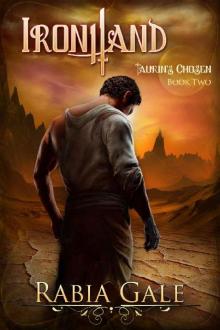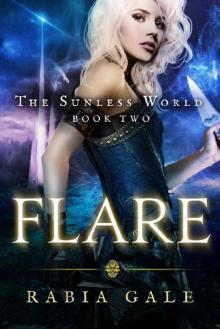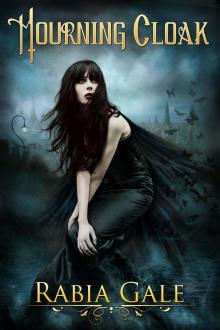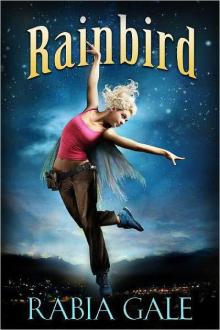- Home
- Rabia Gale
Ironhand (Taurin's Chosen Book 2)
Ironhand (Taurin's Chosen Book 2) Read online
IRONHAND
Taurin's Chosen Book Two
Rabia Gale
* * *
Kato Vorsok closed the Gates and sealed in the enemies of all mankind. Now he’s stranded in the desert with a ragtag army of supernatural creatures far from home. Keeping order and finding provisions are the extent of his problems.
Or so he thinks.
Deep in the salt, an ancient demon from a mythic past stirs. Once, angels walked the world and battled such monsters, but they’ve been gone a long time.
Now there’s only Kato, a reluctant hero with no illusions about himself, and Flutter, a woman-turned-demon who’s falling apart.
They won the battle, but will they lose the war—and the whole world with it?
* * *
Ironhand is a fantasy novella.
Published by Rabia Gale
Cover art and design by Ravven
Copyright © 2015, by Rabia Gale. ALL RIGHTS RESERVED
This e-book is licensed for your enjoyment only. No part of this publication may be reproduced, distributed, or transmitted in any form or by any means, including photocopying, recording, or other electronic or mechanical methods, without the prior written permission of the publisher, except in the case of brief quotations in reviews.
This book is a work of fiction. Any resemblance to persons, living or dead, is purely coincidental.
Table of Contents
Prologue
Ironhand
* * *
Books by Rabia Gale
About the Author
Prologue
Operation Shiknai—Glory, in the language of the Taurin-worshippers—was a failure. But then it had always been a long stretch.
The Highwind scout lay on his stomach atop the ridge and peered down at the valley of Tau Marai through his binoculars. The mechanical pieces of its ancient guardians lay scattered about like broken toys, interspersed with the groaning bodies of the army Sera Vorsok had led against them. Dark stains dotted the ground.
Sera Vorsok was dead and her project with her. For four years, Highwind had supported the foreign woman’s scheme to destroy her people’s old enemy, break open the city of Tau Marai, and steal its treasures. Highwind had helped fake her death, and hidden her as she worked. She’d been given funding and equipment: all the support needed to engineer a cohort of Highwind’s supernatural creatures into super-soldiers. Mourning cloaks and wind swifts, eerie men and night walkers—all had been modified for this fight. The higher-ups had even turned a blind eye as the woman wreaked vengeance on those of her people she believed had betrayed her.
The scout grimaced, remembering certain missions. He’d been prepared to get his hands dirty in his type of work, but kidnapping scared women and dragging them back to Highwind to be stripped of their humanity hadn’t been part of his expectations.
Still, Sera Vorsok had come close to achieving her goals.
The scout scanned the valley, pausing at a weary, defiant figure, grimly pushing himself from one broken, bleeding body to the next.
Kato Vorsok, still going even after the day’s betrayal and battle, and despite losing his right hand.
He’d been a surprise.
Sera Vorsok had spoken dismissively of her husband as someone who’d lost his fire after his defeat in this very valley several years ago. He’d fled to Highwind with his wife, and dwindled into a mere drinks’ shop owner. Kato would be no threat to their plans.
Sera had misjudged. One of her victims—a woman turned into a demon—had escaped the laboratory and made her way to Sera’s husband. Kato Vorsok had finally woken from his malaise. This was the man, after all, who was the Chosen of the southerners’ god, who’d been lauded and hailed as the Champion of these lands.
Today, the scout had seen Kato transform his own body into a weapon, skin hardened to iron and sword blazing as an extension of his arm. Single-handedly, he’d taken down a swarm of giant acid-spitting flying beasts.
And when Sera Vorsok died opening the Gates of Tau Marai, it was Kato Vorsok who closed them.
The scout pulled a cylinder from his belt and popped the cap open with a flick of his thumb. A hiss, and a golden scroll slid out. The scout stretched it flat with his left hand—it felt uncomfortably like warm skin—and wrote with a stylus. No words appeared, but the parchment grew more alive, edges curling in impatience, hues of brown and yellow and orange shivering through it.
The scout placed his thumbprint at the bottom of the missive and lifted his hand. The released creature—both messenger and message—scuttled away, blending into the desert landscape. It was soon out of sight.
The scout wriggled backward, away from his lookout position. He’d watched, and he’d reported.
Now it was up to the Director to make the next move.
Ironhand
THE SALT FLATS GLITTER UNDER a heat-bleached sky. Mountains of rock are frozen mid-tumble into the valley below. Their slopes are bare, banded yellow and orange and brown. Only a single skeletal structure, with stilt-like legs and a cone-shaped top, breaks the landscape.
The stillness of a thousand dry seasons lies sweltering on the valley floor, sweating salt. The salt is divided into hexagonal cells, edged with thick white crystalline braids.
Nothing changes here. Nothing ever will.
But wait.
Something comes over the mountains. Something slight and small and invisible.
A breath of air.
It nudges at the slurry of stillness, lightly first, then harder. Wind slides, banner-like, into the valley and the ancient quiet gives way, slowly, reluctantly.
Salt specks spiral up into the air. The white surface cracks. A low throbbing hum emanates from the conical top of the lone structure.
The wind increases in strength all afternoon and evening, as the sun sweeps the sky and the earth groans in reply.
The horn blows, deep and urgent and continuous.
But there is no one to hear.
Flutter is dying.
They all are, these creatures of cool Highwind, withering in the dry heat and the bright light. Eerie men pant in the courtyard of Kaal Baran; cobble crunchers hide in its nooks and crannies. Sera’s altered wind swifts evaporated a long time ago, and the mourning cloaks are spread thin and turned to mist, damp patches on the rocks.
And these are just the survivors.
I gave mercy to many more the day the Gates closed again, in the deepening twilight. I stumbled from one broken body to another, stepping in blue and black and gold blood, the stench of rot in my nose, and dispatched the wounded with a few muttered phrases. Bits of prayers to Taurin, substituting ishtaur for itauri. Replacing darkchild for Taurin’s child, in case he was inclined to be merciful to these poor creatures.
Who am I fooling?
I’m dying, too, trapped in Kaal Baran with an almost-dried up well and barely any food. Well I know that the trip to the nearest settlement is over a week long. Sera expected to be supplied through her portal in Highwind, but that portal is now gone. Flutter and I have looked at the consoles Sera set up in the Chamber of Secrets. We’ve pressed buttons, tugged wires, kicked at the blasted boxes.
All right. I kicked the boxes.
Nothing.
There’s weaponry in other rooms, and a very little store of food. Canned meat for the eerie men and tins of worms for the cobble crunchers. Bags of white crystals for the cloaks—I dump handfuls of it in a trough in the courtyard, then fill it, awkwardly, left-handedly, with water from the well. There’s mud in the water, but the cloaks don’t care. They float in from cracks and mist up out of wall, put their pale faces into the water and feed.
I don’t watch them.
&nbs
p; But there is one place I haven’t yet looked at. One place that I never told even Sera about, never mentioned to Flutter, would never go to with an entourage of Highwind creatures dogging my steps and peering over my shoulders—or in the case of cobble crunchers, from behind my legs.
It’s the thought of curious eyes that hold me back from that chamber, I tell myself. Coward, I think a moment later.
No, that place is not meant for failures and blasphemers like me.
Instead, I look for Flutter. She’s not inside the courtyard, of course. No, she’s out in the valley.
The gates of Kaal Baran are open, and I walk down the ramp into the narrow valley. The ground between me and the bronze Gates of Tau Marai, small in the distance, is scuffed and stained from the recent battle. We buried the dead bodies, but the broken bits of golems are still there. I don’t like leaving them, but we haven’t the strength to move them.
We know so little about golems, even after all these years of fighting them. Why shouldn’t they reassemble themselves out of the parts strewn across the battlefield and walk off it?
I pass what looks to be a small grove of bare trees. Night walkers, rooted in the shadow of the canyon wall. They haven’t moved in days. They’re the only part of Sera’s army—now my responsibility—that haven’t tried to kill me, either intentionally or not, nor complained about being hungry or tried to steal my shoes or take over. No, they’ve just stood there and that’s earned them a bucketful of water around their ankles every evening.
Highwind is a place of water. The Salera Desert is not.
Flutter’s a shadow at the foot of the ramp, thin and insubstantial in the hot brightness. I stumble over a stone, and reach out for the wall with my right arm.
Right. I don’t have a hand there anymore.
The stump bangs against the wall, and I lean my shoulder in as I catch my balance. The missing hand weighs down my right arm. Why does absence have so much mass? It almost matches the dark pit in my soul, constantly threatening to drag me down.
I kick pebbles down the ramp as I continue on my way. They skip and skitter almost down to Flutter’s feet, but she pays no mind, intent as she is on a small cloud hovering above the ground.
Bringing back yet another cloak.
I stop behind Flutter, giving her space. The cloud of dust shudders, and slowly forms itself into the shape of a woman.
Her face and body are the color of sand, her features crude and exaggerated, her body a suggestion with no details. She looks like one of those old statues of women dug out of the desert from time to time, ones that are all stylized lines and curves.
She gathers in on herself for one breath. One inhalation, one heartbeat, and she’s a cloak again, pale-faced and dark-eyed, a shiver of dark membranous cloak-wing behind her.
And then she shatters.
I lunge for Flutter—left hand!—grab her shoulder (for a moment my fingers hold cool air), and spin her around and down.
I screw my eyes shut, and a crackle of power surges around us. Particles sting my cheek, burn against my neck. The darkness behind my eyelids turns a dull red which bleeds itself out into blackness.
I peek out through a half-open eye.
The other cloak’s gone.
Flutter flows out of my grasp, and to the place where the other cloak had been. There’s a grey tinge to her white skin, and her eyes look like the holes of masks, showing nothingness. I think I see light glimmering through her, as if she were full of minute holes, and then I don’t look closely any more.
“You should eat,” I tell her roughly. “Or else you’ll disappear, too. Come on.”
Flutter doesn’t answer. She’s still looking at that damn patch of earth.
“I didn’t even know her name,” she says, soft as mist. “But we hatched at about the same time and slept in cells next to each other. She smelled like those purple wildflowers that grow above Highwind in the spring.”
I make a frustrated sound behind my closed lips. “Why do you torture yourself like this? Why bring them back—to all this?” My gesture encompasses city, valley, and fort. “To a place they don’t belong, to the knowledge that memory and identity has been taken from them.”
“Not forever,” says Flutter. “Things that have been taken can be returned. What is lost is found again.”
She sounds more and more eilendi-like every day. Spouting enigmatic proverbs and truisms.
Doesn’t she realize that she’s one of the lucky ones?
Or, the unluckiest. To remember so much about her past life, and yet so little.
“What’s your name?” I ask.
She starts. “My-my what?”
“Flutter is what I called you. You had a name once. What is it?”
Her eyes widen, on the edge of turning into the faceted smoke-dark eyes of a cloak. I tense, and feel my spiders snap to alertness, ready to defend me, weakened as they are.
I push them back down. No transformations.
“I don’t know,” Flutter says at last. “I don’t know.” She shrugs her thin shoulders. “Flutter is as good a name as any for now.”
I know she’s lying.
A cloak drifts over to us as we enter through the doors of Kaal Baran. I call her Cloud, as in she has her head in them. She seems to live with only one foot in the real world.
I never knew that cloaks had personalities, but then, most of the time we were too busy trying to kill each other.
“They’re back,” she says.
“Who’re back?” I ask, but with little hope of a response.
True to form, Cloud’s already passed by and down to wherever she sleeps away the afternoon.
Flutter gets visibly tense, hardening at the edges. “The eerie men.”
“Ah, the band we lost.” I see them now, strutting across the courtyard, looking far too pleased with themselves. Soldiers straggling in after going willful missing.
“Perhaps I should—“ begins Flutter, but I’m already striding ahead of her. She’ll want to talk to them, because that’s what she does. Being a silent cloak must’ve just about killed her, the role is so alien to her character.
Eilendi like to teach, relate, discuss.
But that’s not how you run an army.
The eerie men halt when they see me. The minions have the grace to flinch and look ashamed, but the leader—Leap’s his name—gives me a grin full of teeth. They smell like unwashed male and fresh blood. Red stains their claws and teeth.
I catch sight of hair in their nails. Goats.
Of course.
I nudge my spiders down my left arm, asking for a little reinforcement. Leap opens his mouth—to explain, to boast, I don’t know and I don’t care.
He never gets a word in because I punch him right in the face.
He goes down like a sack full of bricks. And stays down.
The other eerie men jump, fumbling for the whips and spikes at their belt. I grab the nearest by the wrist—left hand!—and squeeze. The man gasps, turns a pale bluish color from the pain.
“Don’t—ever—leave—without—permission!” I rake the group with my coldest gaze. “Put down your weapons. Now.”
There’s a shuffling and a clatter of weapons hitting the ground. I let go of the wrist I’m holding.
“You and you.” I point. “You’re on latrine duty. You can tell the workers digging the trench that they’re relieved because you’re taking over. You—you can go polish armor in the weapons room. You, help the cobble crunchers clear the south passage on the basement level.”
“And you—” I look at the eerie man massaging his wrist—“get him away from here.” I prod Leap with my boot. “Put him somewhere he can sleep it off.
“Now.”
They leave, some stumbling in their haste, others a shade away from sauntering, as if to tell me they don’t really care. Their expressions range from sulky to studied disinterest.
One gives me a narrow-eyed look, glittering with malice, as he leaves.
That one will be trouble.
Flutter joins me and we watch as Leap is dragged away. His boots leave thin dirt tracks.
“That was—direct,” she observes.
“Actions, not words, will keep them in line.”
“How’s your hand?”
I bite back the words Which one? just in time. It’s easy to resist cradling my aching left hand since I’m down to only the one. “I’ll live.”
“Eerie men have hard skulls.” Flutter looks at the smear of brownish dirt from Leap’s boots. “Where do you think they went?”
“Goat hunting in the Scrabs by the looks of it.”
She winces. Some herding family just lost part of their livelihood. “We’ll have to pay blood gift.” I realize what a relief it is to talk to someone who understands the way of the many-banded lands, Taurin’s lands.
“Yes.” Another thing to add to my list: Track down the family that lost their goats and pay them off. With what?
“There’s bound to be something in there.” Flutter looks towards Kaal Baran. “Scrap metal, crystals…” She shrugs. A family living at the edge of the desert would be more interested in food and clothing than any antique from the fort.
“I’ll look in the stores that were brought from Highwind. Maybe they will accept some poly tents or light armor.” Even as I say this, I’m bitterly amused at the verbal contortions we’re both going through to avoid saying S—my dead wife’s name.
A shriek pierces the air, rises higher in a wail that goes on and on. An eerie man passing by drops his tools and claps his hands to his ears. Cobble crunchers swarm into the fort, fleeing the noise.
“Screech,” I mutter.
Flutter winces. It was her idea to put the unstable cloak on sentry duty, away from the accidental nudges or sidelong glances that sent Screech into hysterics.

 Ironhand (Taurin's Chosen Book 2)
Ironhand (Taurin's Chosen Book 2) Flare: The Sunless World Book Two
Flare: The Sunless World Book Two Ghostlight (The Reflected City Book 1)
Ghostlight (The Reflected City Book 1) Mourning Cloak
Mourning Cloak Rainbird
Rainbird